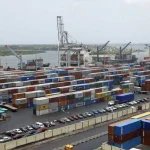After two decades of dormancy, the Nigerian government has taken a significant step to revitalize its maritime sector by activating the Cabotage Vessel Financing Fund (CVFF). Minister of Marine and Blue Economy, Adegboyega Oyetola, has directed the Nigerian Maritime Administration and Safety Agency (NIMASA) to begin the disbursement of the long-awaited fund, offering up to $25 million per qualified Nigerian shipping company.
The CVFF, established under the Coastal and Inland Shipping (Cabotage) Act of 2003, was designed to empower indigenous shipping companies through structured financing for vessel acquisition. However, its operationalization has been delayed for over 20 years, until now.
“Today, we are bringing it to life deliberately, transparently and strategically,” Oyetola stated in a press release, emphasizing the significance of this move. “We are not merely funding vessels; we are investing in a future where Nigerian shipping companies can stand shoulder-to-shoulder with their international counterparts.”
NIMASA has already issued a marine notice, inviting eligible Nigerian shipping companies to apply. The funds will be disbursed through approved primary lending institutions (PLIs), ensuring a professional and efficient process. This action is expected to stimulate local shipbuilding and repair industries, generate employment, and reduce capital flight associated with foreign vessel chartering.
“This is a turning point – one that affirms our commitment to local content, economic resilience, and maritime sovereignty,” Oyetola added.
The CVFF aims to address the long-standing challenges faced by Nigerian shipping companies in acquiring modern vessels. Industry stakeholders have hailed this move as a “watershed moment,” acknowledging the potential for significant growth and development in the maritime sector.
“We are doing what should have been done years ago – because our vision is clear. A strong indigenous fleet is not just a matter of pride; it is a strategic national asset,” Oyetola said.
Impact and Future Outlook
The disbursement of the CVFF is anticipated to yield far-reaching benefits, including:
- Growth of a stronger, self-sufficient shipping fleet.
- Generation of significant employment opportunities.
- Stimulation of local shipbuilding and repair industries.
- Reduction of capital flight.
- Enhanced logistics efficiency and global relevance.
Experts believe that with proper implementation, the CVFF will realign the industry towards long-term growth. This initiative by the President Bola Tinubu administration and the Ministry of Marine and Blue Economy signifies Nigeria’s commitment to securing its place in the global maritime economy.
This development could provide a much needed boost to local business owners who have struggled to acquire vessels. The impact on local jobs and the larger economy could be substantial.












